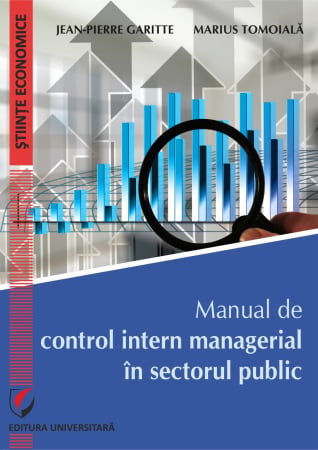ISBN: 978-606-591-880-1
DOI: 10.5682/9786065918801
Publisher year: 2013
Edition: I
Pages: 231
Publisher: Editura Universitară
Author: Vadim Dumitrascu, Roxana Arabela Dumitrascu
- Description
- Download (1)
- Authors
- Content
- More details
- Reviews (0)
The management of financial performances includes the set of activities, organizational structures and decisions that ensure the increase of the financial performance of the enterprise. The content of financial performance management can be approached in a rigorous way only by referring to its object, to the fundamental tasks incumbent on it and to the concrete operational responsibilities entrusted to different specialists within the enterprise.
The object of financial performance management is defined by relating the company to the opportunities and constraints on financial performance, determined both by the characteristics of the business environment (degree of stability and complexity) and the network through which the company relates to the elements of this environment. , respectively the way of carrying out the operations and the flows of resources, work, money, information and managerial regulations inside the enterprise. The management of the financial performances must ensure the most complete and judicious capitalization of the internal and external opportunities, as well as the best adaptation of the enterprise to the internal and external constraints in order to improve its performances. This is achieved by carefully balancing the endogenous and exogenous requirements of economic and financial functionality of the enterprise.
The paper focuses on a systematic and interdisciplinary presentation of the fundamental conceptual and methodological aspects that outline the discipline of financial performance management, being addressed not only to those who study economics, but also to practitioners in the field of economic and financial management.
-
Managementul performantelor financiare. Concepte. Modele. Instrumente
Download
Education:
Faculty of Economics, University "Petre Andrei" of Iasi, specializing in Finance and Accounting (2001);
Post-graduate School of the University FIBAS "Al. I. Cuza" Iasi, master's degree in Economics and Financial Management & Banking (2005);
Academy of Economic Studies (2010), PhD in Finance;
Romanian Academy, SPODE, post-doctoral studies in economics.
Activity:
2001-2011 professor at the Faculty of Economics of the University "Petre Andrei" of Iasi;
2012 Ph.D. Lecturer at the Faculty of Finance, Banking and Accounting, of Christian University "Dimitrie Cantemir" of Bucharest, owner of enterprise financial management courses, insurance and reinsurance and risk management in insurance and reinsurance.
Publications:
Single author: Financial management company. Self-study manual (2012), Insurance and reinsurance. Self-study manual (2012), Prices and and competitivity. Self-study manual (2012), Management of the goodwill value (2008).
Coauthor: Intangible firm capital management (2009), Drift Management (2005), Management versus postmodernity (2005), Defiance complexity (2004), Elements of evaluating companies (2002).
Over 70 articles and studies published in scientific journals.
VADIM DUMITRASCU
Introduction / 9
Chapter 1
The area of financial performance of the enterprise
1.1. Intermediate management balances / 11
1.2. Self - financing capacity / 23
1.3. The relationship between the evolution of performances and the situation of the financial balance of the enterprise / 27
Chapter 2
Profitability as a qualitative dimension of the financial performance of the enterprise
2.1. Commercial profitability rates / 36
2.2. Economic profitability rates / 37
2.3. Financial profitability rates / 39
Chapter 3
The relationship between economic risks and the profitability of the enterprise
3.1. Profitability threshold analysis / 50
3.2. Structural exploitation risk analysis / 54
3.3. Analysis of the sensitivity of the result in relation to the activity level / 58
Chapter 4
Management of the process of creating added economic value
4.1. The process of creating added value / 62
4.2. Sensitivity of the operating result in relation to changes in assets / 64
4.3. Stimulating the process of creating added economic value / 66
Chapter 5
Diagnosis of the financial viability of the enterprise
5.1. The conditions of the financial viability of the enterprise / 68
5.2. Tools for analyzing the financial viability of the enterprise / 70
5.3. The impact of financial viability on the value of the enterprise / 71
Chapter 6
Integrated perspective on the management of the financial performance of the enterprise
6.1. Integrated perspective on economic efficiency at enterprise level / 74
6.2. Articulation of the painting "Effects - Efforts" / 75
6.3. The system of indicators of economic efficiency of the enterprise / 77
Chapter 7
Forecasting the financial performance of the enterprise
7.1. The system of forecast financial statements at enterprise level / 79
7.2. Elaboration of the budget of incomes and expenses / 94
7.3. Preparation of the forecast profit and loss account / 98
7.4. Elaboration of the simplified forecast balance sheet / 100
Chapter 8
Strategies for maximizing the financial performance of the enterprise
8.1. Strategy focused on sustaining the life cycle of the enterprise / 105
8.2. Strategy for optimizing the portfolio of activities / 106
8.3. Investment efforts optimization strategy / 110
8.4. Strategy for optimizing the financial structure and the cost of capital attracted by the enterprise / 112
8.5. The strategy of maximizing the economic (market) value of the enterprise / 114
Chapter 9
Goodwill as an "intangible" source of the company's financial performance
9.1. The content of the notion of goodwill / 118
9.2. The relationship between goodwill and the global value of the enterprise / 122
9.3. Sources of goodwill at the enterprise level / 134
Chapter 10
The courage of goodwill as an instrument of the company's financial strategy
10.1. Goodwill as an essential variable of the financial strategy of the enterprise / 143
10.2. Characteristics of the financial strategy focused on goodwill / 147
Chapter 11
Financial management of enterprise restructuring
11.1. Financial objectives of enterprise restructuring / 159
11.2. Criteria and options in enterprise restructuring / 165
11.3. Maximizing the strategic value of the enterprise / 178
Chapter 12
Goodwill as a tool for the financial recovery of the enterprise
12.1. The function of goodwill in the strategic positioning of the enterprise / 182
12.2. Financial and non-financial levers of enterprise restructuring / 185
12.3. The use of goodwill as an indicator of financial evaluation of restructuring investments / 188
Chapter 13
Peculiarities of financial performance management in conditions of economic and financial crisis
13.1. Crisis management systems and strategies / 202
13.2. Models and strategies of Financial Performance Management in the context of crises / 206
13.3. Financial performance management in the post-crisis phase / 212
13.4. Some punctual solutions regarding the Management of financial performances in time of crisis / 213
Chapter 14
The relationship between financial performance and the value of the enterprise
14.1. Peculiarities of the evaluation of the enterprise based on profitability / 217
14.2. The multitude of profitability values of the enterprise / 219
14.3. Establishing the value of the enterprise by updating future cash flows / 220
Bibliography / 229
The management of financial performances includes the set of activities, organizational structures and decisions that ensure the increase of the financial performance of the enterprise. The content of financial performance management can be approached in a rigorous way only by referring to its object, to the fundamental tasks incumbent on it and to the concrete operational responsibilities entrusted to different specialists within the enterprise.
The object of financial performance management is defined by relating the company to the opportunities and constraints on financial performance, determined both by the characteristics of the business environment (degree of stability and complexity) and the network through which the company relates to the elements of this environment. , respectively the way of carrying out the operations and the flows of resources, work, money, information and managerial regulations inside the enterprise. The management of the financial performances must ensure the most complete and judicious capitalization of the internal and external opportunities, as well as the best adaptation of the enterprise to the internal and external constraints in order to improve its performances. This is achieved by carefully balancing the endogenous and exogenous requirements of economic and financial functionality of the enterprise.
Given the above, we appreciate that financial performance management is a set of analytical methods, decision-making models and operational techniques that allow the company to continuously and systematically consolidate its financial performance by adapting its structures and functions to changes, both incremental and of major magnitude, which are recorded by the business environment.
The fundamental task of financial performance management is directly and completely subordinated to the global objective of the financial management of the enterprise - maximizing the economic value of the business. To this end, financial performance management identifies, diagnoses and optimizes the processes of creating added value. The particular tasks arising from this fundamental task are the following:
1) control of the risks associated with the processes of generating financial performances;
2) monitoring and consolidating the financial viability of the enterprise;
3) developing the potential for long-term growth of financial performance.
The management of financial performances is based on a coherent approach, which includes analytical, decisional and operational elements and which is structured in a complex process consisting of the following stages:
- global strategic diagnosis of financial performance;
- adopting decisions on maintaining and increasing financial performance, through an appropriate arbitration between short-term pressures and sustainable development requirements of the enterprise;
- implementation of decisions on financial performance;
- ensuring a systematic feedback regarding the measures for protection and increase of the financial performances.
Within the financial performance management, a distinction is made between the quantitative and the qualitative dimension of the performance. The quantitative dimension of financial performance refers to the absolute levels of financial returns of the resources allocated to the activity carried out by the enterprise, answering the generic question:
"How much has been achieved from the performance objectives that the company has planned in a given period of time?"
The qualitative dimension of financial performance refers, instead, to the effort or relative cost assumed by the enterprise to achieve the absolute performance obtained, answering the generic question:
"What were the consumption of specific resources (time, money, materials, labor, etc.) involved in reaching the absolute level of performance?"
Also, the management of financial performances distinguishes between the levels of performance training: the individual performance of the worker; work group performance and global organizational performance.
The paper focuses on a systematic and interdisciplinary presentation of the fundamental conceptual and methodological aspects that outline the discipline of financial performance management, being addressed not only to those who study economics, but also to practitioners in the field of economic and financial management.
Lect. univ. Dr. Roxana Arabela Dumitrascu
Assoc. Dr. Vadim Dumitrascu

6359.png)
![Financial Performance Management. Concepts. Models. Tools [1] Financial Performance Management. Concepts. Models. Tools [1]](https://gomagcdn.ro/domains/editurauniversitara.ro/files/product/large/managementul-performantelor-financiare-concepte-modele-instrumente-1193-487806.jpg)














